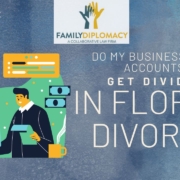Do My Business Bank Accounts Get Divided In A Florida Divorce?
If you own a business and are facing divorce, you may be wondering whether your business bank accounts—the checking, savings, operating, or money market accounts tied to your company—could be considered “marital assets” and divided.
For many professionals, these accounts represent far more than just money. They reflect years of effort, payroll obligations, and the foundation of your financial life. Understanding how Florida law treats business bank accounts can help you protect what you’ve built and choose the right path forward.
Quick Answer: Can Business Bank Accounts Be Divided in a Florida Divorce?
Yes. Business bank accounts can be divided in a Florida divorce depending on when and how the business was created, how the accounts were funded, and whether marital income or marital efforts contributed to their growth. Under Florida’s equitable distribution law, the court can treat those funds as marital property even if the accounts are in only one spouse’s name or owned by the business.
How Florida Law Treats Business Bank Accounts in Divorce
Under Section 61.075, Florida Statutes, courts must divide marital assets and debts fairly, though not necessarily equally. Marital assets generally include property or income acquired during the marriage—regardless of whose name is on the account.
That means if your business was formed or operated during the marriage, the funds in its business bank accounts could be considered marital.
If your business predated the marriage, those accounts might begin as nonmarital. Still, any increase in their balance or new deposits during the marriage can be at least partly marital—especially if marital income was added or your marital efforts contributed to the business’ success and growth.







